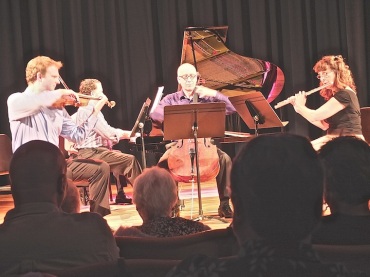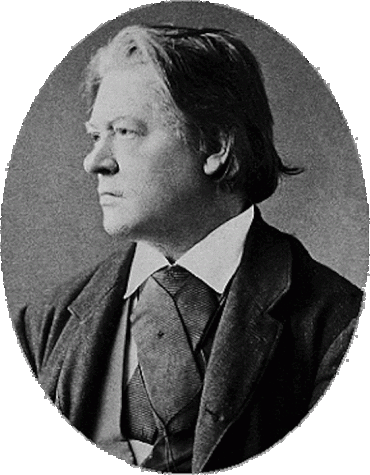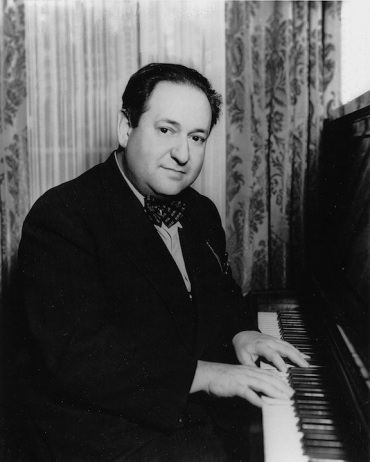The Well-Tempered Ear
Classical music: Once again the Bach Dancing and Dynamite Society violates taboos and brings me wondrous surprises and rare finds in their final two programs of this 22nd season.
3 Comments
By Jacob Stockinger
I am still not sure how they do it. But every summer, the Madison-based Bach Dancing and Dynamite Society brings me and its devoted audiences many surprises – revelations, even – that fill even experienced listeners with both pleasure and awe.
This past weekend provided the last of three weekends and six programs in their 22nd season –- hence the overall theme of “Deuce Are Wild” and the stage sets and costumes based on playing cards – and it proved no exception.
The Ear heard both programs: “Poker Face” on Friday night at the Stoughton Opera House; and “Play the Hand You’ve Been Dealt” at the Overture Center’s Playhouse. Both concerts had good sized and enthusiastic audiences, though not the sold-out houses they deserved.
In “Poker Face,” BDDS explored the art of transcription – one of the taboos that these supremely talented but also humane, funny and down-to-earth musicians like to break as they take the music seriously, but not themselves.
In this case, the program featured another Classical era concerto in a chamber music arrangement. This time is was Mozart’s lovely Piano Concerto No. 22 in E-Flat, K. 482, as arranged by the pianist, composer and student of both Mozart and Beethoven, Johann Nepomuk Hummel. (Last year, it was a late Haydn symphony as arranged by Haydn’s friend and impresario, Solomon.)
Five Songs, or “melodies,” for soprano and piano by Sergei Prokofiev also were re-arranged for the flute and piano. One wonders what happened to the words, if any ever existed and the music was not originally simple vocalises. But they nonetheless provided a sparkling opening or curtain-raiser.
Finally – and most impressively – the BDDS guest players, the San Francisco Trio of BDDS pianist Jeffrey Sykes plus guests violinist Axel Strauss and cellist Jean-Michel Fonteneau -– played a very usual arrangement. It was the String Sextet in G Major by Brahms that was arranged for piano trio by Brahms’ friend Theodor Kirchner (below).
Unusual maybe; but it proved very successful. Little wonder that, as Sykes explained, Brahms knew of the transcription and approved of it. For one, the trio form allowed the piano to contrast with and cut through the very rich texture of the original six string instruments. Brahms liked the piano trio as a genre, and composed three great ones. So, why not a derivative one?
Once again, BDDS showed how transcriptions popularized music into home and smaller venues and groups in the days before radio and recordings.
Transcriptions are often looked down upon these days –- sort of crossover music. But almost all of the great Baroque and Classical era composers borrowed from their own works and others’ to make transcriptions.
Sticking to the original form is just another of those serious longhair myths or fictions – like not clapping between movements and not playing isolated movements from great works – that just don’t stand up as historical fact.
We are lucky to have someone to show us the mistakes of overzealous purity. And that is something BDDS does supremely well every summer.
The second program also had its unusual moments. For one, it offered a Flute Quartet by the Dutch composer Dick Kattenburg (1919-1944, below), who died in Auschwitz at 24. What a loss! Who even knew of this composer, who could sounds both classical and jazzy a la George Gershwin (check out the slow moment of the Flute Quartet that the BDDS played in a YouTube video at the bottom.)
And if you look down on YouTube, you might do well to recall that pianist Sykes himself apparently discovered the music of Kattenburg on YouTube, which is using hi-tech to rescue serious composers from near-total obscurity. He wrote such wonderful and suitably eclectic and playful pieces that BDDS promises to perform more in future season, including a work for piano-four hands and a tap dancer.
In the same concert, BDDS played a work by another composer who survived the Holocaust by fleeing to Hollywood where he became better known for his scores to swashbuckling movies than for his serious concert music. But Erick Wolfgang Korngold has been undergoing a rediscovery, and his Suite for two violins (with Madison Symphony Orchestra concertmaster Naha Greenholtz making her BDDS debut), cello and piano LEFT-HAND was an impressive and welcome new offering.
(PS: The unusual left-hand scoring comes because the work was commissioned by pianist Paul Wittgenstein (below), brother of famed philosopher Ludwig Wittgenstein, who lost his right arm in World War I and then commissioned the famous Concertos for Left Hand from Maurice Ravel and Sergei Prokofiev.)
This proved both a forcefully fiery and lyrical work that deserves a wider hearing. But so far as I know, both the flute quartet by Kattenburg and the suite by Korngold (below) were premieres for Madison and maybe even Wisconsin or the Midwest.
What can one say but: Thank You.
And to show that BDDS isn’t just about horsing around – although there was some of that in card costumes (below) and everyone sang Happy Birthday to a 17-year-old audience member – the San Francisco Piano Trio turned around and closed out the season by showing how a new approach illuminates an old masterpiece.
The work in question was Beethoven’s “Archduke” Trio, Op. 97, an unqualified giant and genius of a work from The Master. But instead of the loud, somewhat martial approach that the opening theme invites — similar to the “Emepror” Piano Concerto — the players emphasized the softer side and balance, especially the dialogue between the violin and cello.
The effect of such subtlety and nuance was to hear an old and familiar work as if it were new and unfamiliar. It was a quiet triumph that proved beautiful and totally engaging.
So at the end of the BDDS season, what are you left with?
Well if you are at all like The Ear, you are not especially anxious for winter to return, especially given the long, wet and cold spring and summer we have had so far.
But if you are like me, you too are anxious to see what cards (so the speak) the Bach Dancing and Dynamite Society has up its sleeve for next season – its 23rd– and eventually for its Silver Anniversary 25th season.
The old saying has it that the only thing we can be sure of is change.
In the case of BDDS, The Ear would simply add the words “and great music.”
Tags: Auschwitz, Axel Strauss, BDDS, Dick Kattenburg, Erich Wolfgang Korngold, George Gershwin, Jacob Stockinger, Johann Nepomuk Hummel, Johannes Brahms, Ludwig van Beethoven, Madison, Madison Symphony Orchestra, Overture Center, Sergei Prokofiev, Stoughton Opera House, Wolfgang Amadeus Mozart, YouTube








